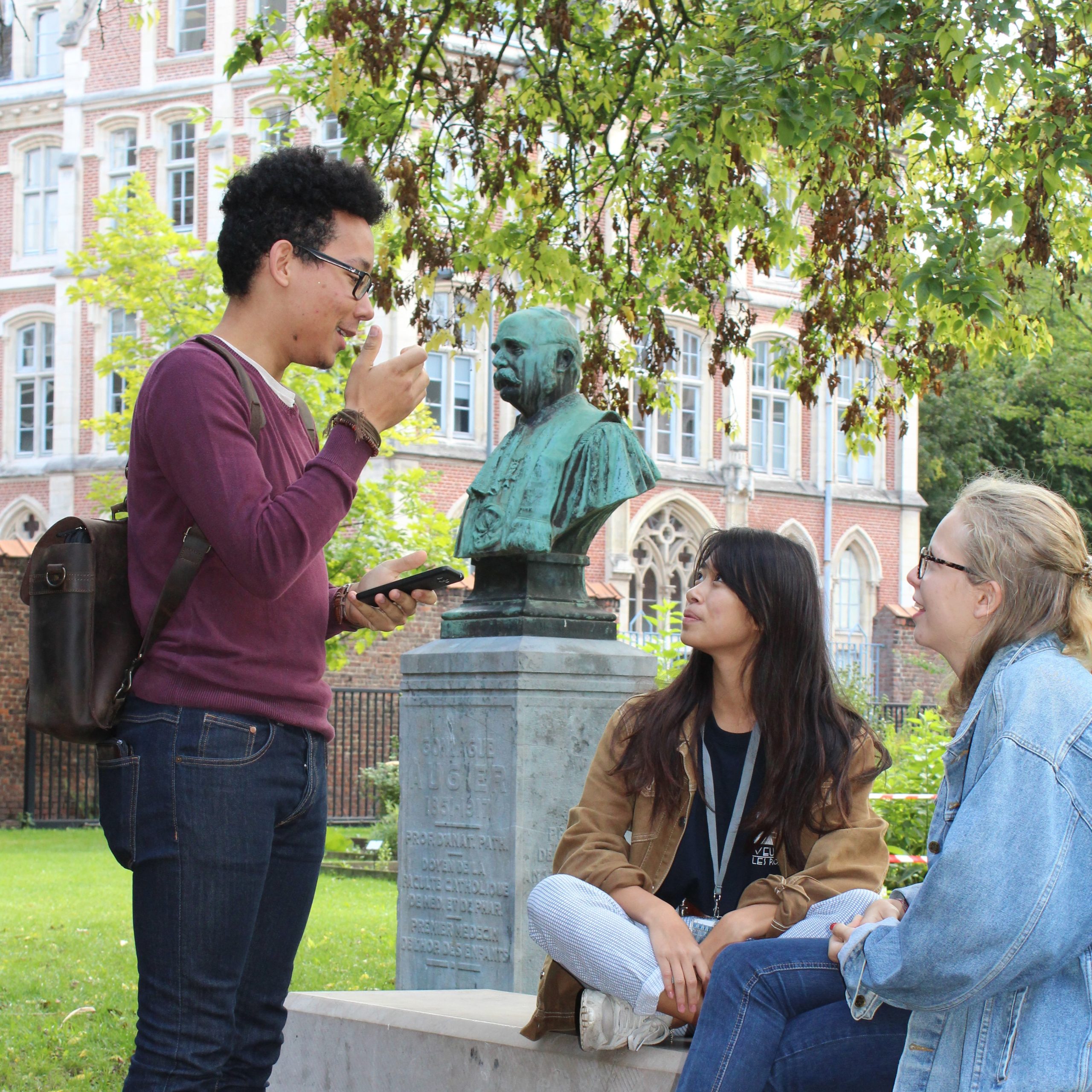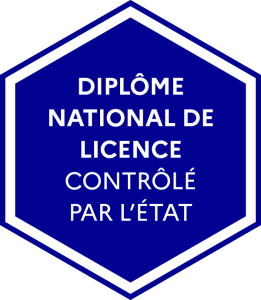Bachelor’s in International Relations

Bachelor’s degree in international relations
A solid analytic and critical understanding of global politics
The Bachelor’s Degree in International Relations is a comprehensive multidisciplinary programme that provides students with a solid analytical and critical understanding of international politics. The challenges involved in armed conflicts and peacekeeping, political violence and terrorism, economic growth and inequality, the environment, energy and migration lie increasingly beyond the regulatory scope of states and are raising a growing number of political and ethical issues for the future of the world. Global politics are so deeply embedded in historical, economic and legal structures, institutions and processes that they cannot be analysed from a single disciplinary perspective.
Overview
The goal is to develop students’ analytical and practical skills while providing them with an advanced understanding of global politics.
- A multidisciplinary approach combining different perspectives preparing for further studies in multiple disciplines.
- Primarily taught in English, this degree prepares students for the international job market and studies with an international outlook.
- Combination of theoretical reflection and practical skills
Programme
This Bachelor’s Degree programme is designed to enrich the analysis of international relations through historical, legal and economic perspectives and in terms of development through specialised courses. It also proposes classes on political issues specific to certain regions of the world, such as the Middle East, Latin America and Southeast Asia.
In order to encourage students to succeed, various mechanisms have been put in place:
- KHOLLES: This 30-minute oral examination generally includes a question from the course or a commentary on a text and is divided into three parts: presentation, discussion and debriefing.
- TUTORING: Possibility to ask a teacher for a meeting in order to submit a problematic seen in class or to deepen questions related to teaching.
- ROLE PLAYING: Theatrical situations conducive to oral expression during several courses, in particular EU Policy Making and Economic, Social & Political Ethics…
Career opportunities
The Bachelor’s degree in International Relations is a diploma at BAC +3 level (180 ECTS credits). It offers students the possibility of continuing their studies in France or abroad in a Master’s degree in several fields:
- Institutes of political studies.
- Journalism.
- Communication.
- International relations.
- Social sciences.
- Law.
- Economics,
- Urban planning.
- Sustainable development.
- Security.
- Governance.
- Agri-food.
Students can continue their studies by choosing one of the Masters offered at ESPOL:
- Master’s in Global and European Politics
- Master’s in Food Politics and Sustainable Development
- Master’s in International and Security Politics
- Master’s in Digital Politics & Governance
They can also take the European, national and local civil service exams.
Damian RAESS
Course schedule
Semester 1
Semester 2
Semester 3
Semester 4
Semester 5
Semester 6
Unités fondamentales
| Introduction aux relations internationales | 24h | 4 ECTS |
| Introduction à la science politique | 24h | 4 ECTS |
| Travaux dirigés d’introduction à la science politique | 16h | 2 ECTS |
| Khôlles | 2 ECTS | |
| Introduction to Public International law | 24h | 4 ECTS |
| Travaux dirigés de Global History | 18h | 2 ECTS |
| Global History | 24h | 4 ECTS |
Unités d’approfondissement
| Introduction à l’économie | 18h | 3 ECTS |
Compétences fondamentales
| Professionnalisation | 4h | |
| Méthodologie du travail intellectuel et bases de l’argumentation | 16h | 1 ECTS |
| Ateliers de sensibilisation aux Violences Sexistes et Sexuelles | 4h | |
| LV1 | 30h | 2 ECTS |
| LV2 | 16h | 2 ECTS |
| LV3 | 15h | 1 ECTS |
Core courses
| Introduction aux relations internationales | 24h | 4 ECTS |
| World Politics | 24h | 4 ECTS |
| Khôlle | 1 ECTS | |
| Histoire des idées politiques anciennes et modernes | 24h | 4 ECTS |
| Séminaire de lecture | 16h | 2 ECTS |
| Applied Statistics | 24h | 4 ECTS |
| Applied Statistics tutorials | 16h | 2 ECTS |
| Maths refresher | 6h | 1 ECTS |
Advanced courses
| Economie politique | 18h | 3 ECTS |
Core skills
| Journée européenne | 10h | / |
| Study trip | 10h | / |
| LV1 | 16h | 2 ECTS |
| LV2 | 16h | 2 ECTS |
| LV3 | 15h | 2 ECTS |
Unités fondamentales
| Theories of International Relations | 24h | 4 ECTS |
| Theories of International Relations tutorials | 16h | 2 ECTS |
| Foreign Policy Analysis | 24h | 4 ECTS |
| Epistémologie des sciences sociales | 24h | 4 ECTS |
| Travaux dirigés d’épistemologie des sciences sociales | 16h | 2 ECTS |
| Histoire des idées politiques contemporaines | 24h | 4 ECTS |
Unités d'approfondissement - Cours obligatoires
| Comparative Politics | 18h | 3 ECTS |
Unités d'approfondissement - Cours électifs (1 au choix)
| Sport and Politics | 18h | 3 ECTS |
| Geopolitics in the Indo-Pacific: Society and Security in East Asia | 18h | 3 ECTS |
| Middle East | 18h | 3 ECTS |
| South Asia: A World Region between Past and Present | 18h | 3 ECTS |
| Power and Ethnicity in Latin America | 18h | 3 ECTS |
| Système Politique de la Russie | 18h | 3 ECTS |
| [Lecture d’oeuvre:] De la démocratie en Amérique, Alexis de Tocqueville [FR] | 18h | 3 ECTS |
| [Lecture d’oeuvre:] From Ancient Rome to Czech Republic, a journey through European Literatury and Political Masterpieces | 18h | 3 ECTS |
| [Lecture d’oeuvre:] L’exploitation domestique, C. Delphy/D. Leonard | 18h | 3 ECTS |
Compétences fondamentales
| Professionnalisation | 10h | / |
| Essay Writing Workshop | 16h | 1 ECTS |
| LV1 | 16h | 2 ECTS |
| LV2 | 16h | 2 ECTS |
| LV3 | 15h | 2 ECTS |
Core courses
| Politics of Development | 24h | 4 ECTS |
| Politics of Development tutorials | 16h | 2 ECTS |
| International Political Economy | 24h | 4 ECTS |
| International Political Economy tutorials | 16h | 2 ECTS |
| Europe and the European Union | 18h | 3 ECTS |
Advanced courses - Compulsory
| International Organisations | 18h | 3 ECTS |
| Politics of International Law | 18h | 3 ECTS |
Advanced courses - Optional (choose 2)
| Applied Statistics Level 1 | 18h | 3 ECTS |
| Elite interviewing and survey research | 18h | 3 ECTS |
| Document analysis (content analysis, archival work) | 18h | 3 ECTS |
| Qualitative analysis in social sciences (case study, process-tracing, small-N comparison, QCA) | 18h | 3 ECTS |
| Ethnographier le genre | 18h | 3 ECTS |
| Théorie politique internationale appliquée | 18h | 3 ECTS |
Core skills
| Journée européenne | 10h | / |
| LV1 | 16h | 2 ECTS |
| LV2 | 16h | 2 ECTS |
| LV3 | 15h | 2 ECTS |
Unités fondamentales
| Politics of Development | 24h | 4 ECTS |
| Politics of Development tutorials | 16h | 2 ECTS |
| Comparative Politics | 24h | 4 ECTS |
| Comparative Politics tutorials | 16h | 2 ECTS |
| EU External Action | 18h | 3 ECTS |
Unités d'approfondissement - Cours obligatoires (1 au choix)
| Security, Risk, Uncertainty | 18h | 3 ECTS |
| Borders, Mobility and Migration | 18h | 3 ECTS |
Unités d'approfondissement - Cours électifs (2 au choix)
| Advanced International Relations Theories | 18h | 3 ECTS |
| Political Philosophy of Migration | 18h | 3 ECTS |
| Outer Space Law and Policy | 18h | 3 ECTS |
Compétences fondamentales
| Professionnalisation | 10h | / |
| LV1 | 16h | 2 ECTS |
| LV2 | 16h | 2 ECTS |
| LV3 | 15h | 2 ECTS |
Core courses
| Dossier de recherche | 8 ECTS | |
| Diplomacy, Negotiation, Mediation | 24h | 4 ECTS |
| Diplomacy, Negotiation, Meditation tutorials | 16h | 2 ECTS |
| Armed Conflicts and Peace-Making | 24h | 4 ECTS |
Advanced courses - Compulsory
| Political Science Research Methods | 18h | 3 ECTS |
Advanced courses - Optional (choose 2)
| Global Health | 18h | 3 ECTS |
| State Making in International Politics | 18h | 3 ECTS |
| Politics of the Anthropocene | 18h | 3 ECTS |
| Philosophie des Droits de l’Homme | 18h | 3 ECTS |
| People Power: The Strategic Dynamics of Civil Resistance | 18h | 3 ECTS |
| Music and Politics | 18h | 3 ECTS |
| Histoire, Politique, Mémoire (service learning) | 18h | 3 ECTS |
| “Una historia comparada de la Península Ibérica, siglos XX y XXI: repúblicas, fascismos, Europa” | 18h | 3 ECTS |
| MUN | 18h | 3 ECTS |
Core skills
| Journée européenne | 10h | / |
| LV1 | 16h | 2 ECTS |
| LV2 | 16h | 2 ECTS |
| LV3 | 15h | 2 ECTS |



